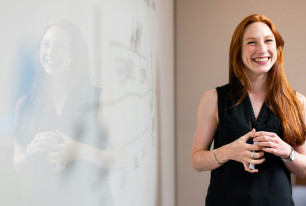Neurodiversity Research: Understanding Candidates’ Strength and Experiences
Over the last year, our Science team has been working on our Neurodiversity Research Program. Read our blog to learn some key takeaways from the study, particularly on the strength and experiences of neurodiverse talent.
Share
April is Autism Acceptance Month, a reminder to reflect on the progress of SHL’s Neurodiversity Research Program. Since our last update, our clients’ interest in the fairness of using assessments for neurodiverse talent continues to accelerate, and so does our commitment to this important research.
The movement for Diversity and Inclusion, combined with the wider recognition and appreciation for the competitive advantage that neurodiverse talent can bring, have combined to spark a turning point such that 2021 has been described as “the year that the neurodiversity movement came of age.”
Neurodiversity Research Program Updates
Over the last year, we have remained focused on progressing our Neurodiversity Research Program to gain insights into the neurodiverse talent pool in two areas: strengths and experiences.
Understanding Strengths
We are continuing data collection on SHL Direct, our site where candidates can go to take practice assessments. The application form we have used on this site over the last year provides the opportunity for individuals to voluntarily disclose a disability before beginning a practice test. This information enables us to learn about the relationship between self-disclosed disability status and assessment performance outcomes. We are continuing to collect this data for three types of practice cognitive ability tests (SHL Verify Inductive Reasoning, SHL Verify Numerical Reasoning, and SHL Verify Verbal Reasoning), with the goal of increasing our sample sizes to bolster confidence in the preliminary findings we reported last year.
Next, we are going both dig deeper and get broader with our research.
- Digging deeper. We have implemented an updated application form that allows individuals to disclose disabilities with more precise categories than the application form we used last year (for example, we now have a separate category for “autism” specifically). Given the breadth of neurodivergent conditions, more detailed response categories will facilitate our understanding of individuals’ nuanced strengths across different types of neurodivergent conditions.
- Getting broader. We have expanded our data collection efforts on SHL Direct to understand the relationship between self-disclosed disability status and performance outcomes when completing practice Apta assessments, the behavioral measure of SHL’s Universal Competency Framework. We have also obtained a small sample of data that begins to shed some light on the strengths of the neurodiverse talent pool as measured by the Occupational Personality Questionnaire (OPQ).
Our clients’ interest in the fairness of using assessments for neurodiverse talent continues to accelerate, and so does our commitment to this important research
Understanding Experiences
We are continuing to advance the candidate reactions study, in partnership with our research team at Florida International University. This study explores reactions to a variety of assessments by those who consider themselves to be autistic. The first phase of this study is focused on reactions to SHL Verify, Apta, video interview, and situational judgment tests. We are looking to understand the features that contribute to a positive experience so that we can implement these learnings in our future assessment development efforts, with the goal of creating inclusive assessments that are fair and accessible to a diverse talent pool. To date, we have successfully completed the pilot study and are now actively recruiting participants for the main research study.
Key takeaways
Through our research, we are starting to understand the strengths and experiences of the neurodiverse talent pool. We continue to see evidence that individuals who complete practice tests on SHL Direct and consider themselves to be autistic score slightly better on our SHL Verify cognitive ability tests and complete the tests slightly faster than those who did not disclose a disability.
Additionally, early results from our small samples of data highlight the behavioral strengths of the neurodiverse talent pool relative to neurotypical comparison groups in the areas of:
- Analyzing and Interpreting: getting to the heart of complex issues and problems through clear analytical thinking and effective application of expertise.
- Creating and Conceptualizing: applying creativity and innovation to develop new solutions in the context of the organization’s wider strategy.
What’s next?
While we have some initial and informative findings at this time, we will continue to explore data across multiple sources to inform best practices. Specifically, we aim to learn more about:
- Performance outcomes of individuals with self-disclosed neurodivergent conditions besides autism on a wider range of our assessments
- Reactions to various assessment types by the neurodiverse talent pool to inform future product development efforts that will result in a positive candidate experience for a neurodiverse talent pool
- Best practices for creating fair and inclusive assessments that are accessible for all candidates
Interested in our Neurodiversity Research Program? Contact us to learn more about our research partnership opportunities!










